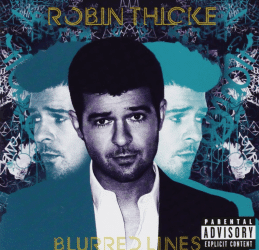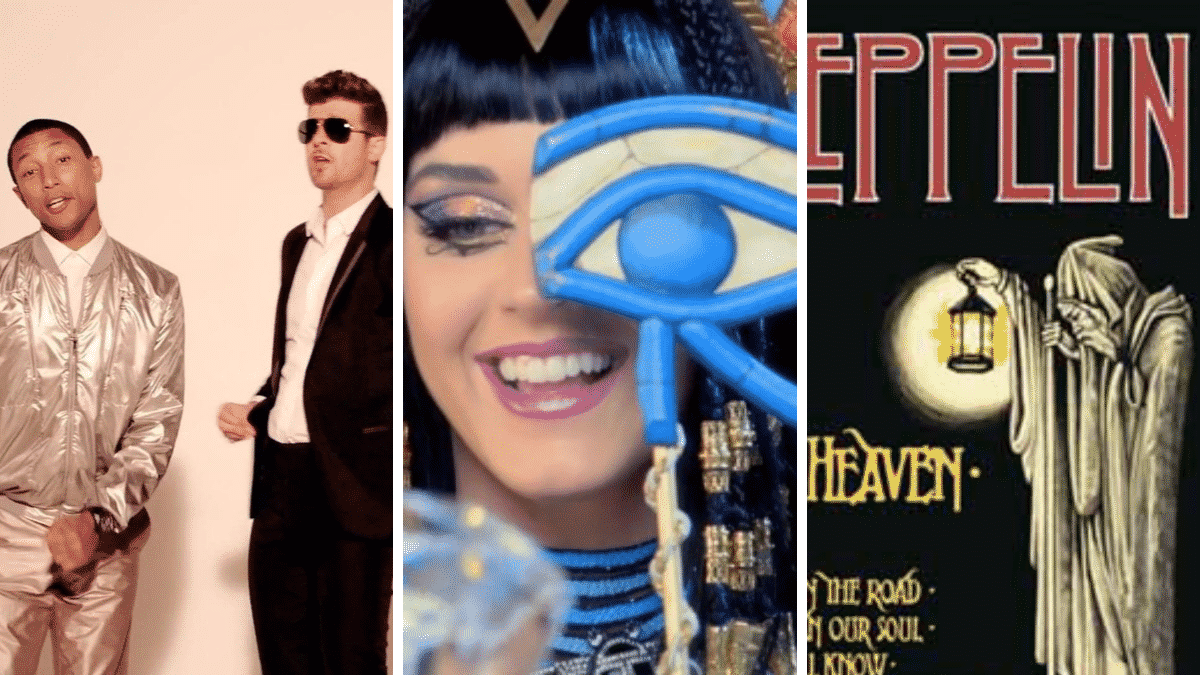On Dark Horses and Blurred Lines
Dark Times for Blurred Horses...

In March 2015, a jury ruled that Robin Thicke, Pharrell Williams and others involved with the song Blurred Lines owed the estate of Marvin Gaye some $7.3 million for the infringement of Gaye’s Got To Give it Up.
The verdict was, to put it modestly, controversial. There was a lot of hand-wringing and concern about what the ruling meant for the future of music as the case, to many, seemed to indicate that a songwriters could protect the “feel” of a song and that would lead to an unhealthy shift in copyright law.
However, the case seemed as if it would be a verdict in a bottle. The verdict was heavily dependent upon the specific facts at play and Robin Thicke was an especially bad defendant, offering contradictory testimony and speaking at length about his drug abuse. Thicke, most likely, was as much of a part of losing that case as any expert witness testimony.
This was seemingly reinforced in June 2016 when Led Zeppelin secured a jury verdict in the lawsuit over their hit song Stairway to Heaven. The band had been accused of infringing the earlier song Taurus, written by Randy Wolfe of the band Spirit. However, in this case, the jury found that there was no substantial similarity and no infringement.
The case currently is heading for an en banc appeal before the Ninth Circuit after a smaller panel of judges ruled the case needed to be retried over issues with the jury instructions.
However, that feeling of calm went away this month as a jury not only ruled that the Katy Perry song Dark Horse was an infringement Marcus Gray’s song Joyful Noise but ordered those behind the song to pay $2.78 million for that infringement. We once again have begun a frighteningly similar pattern of worrying about what this means for copyright law, with many proposing radical reforms, such as having music cases heard before an expert arbitration panel, to stem the problem.
But is there really a crisis? If so, what is there to be done about it? There’s no easy answer to this.
Questions of Fact and Question of Law
Note: I am not a musicologist nor am I a musician. I am in no way qualified to comment on whether or not Thicke or Perry committed copyright infringement. Instead, I’m writing this as an observer of copyright litigation over the past 20 years, 15 of those years presented on this site. Also, we’re going to keep this part extremely simple and basic.

In litigation, there are two kinds of questions that must be answered: Questions of fact and questions of law.
To take a simple case, let’s say that I am suing a third party for trespass on my property. Questions of fact might be things like “Was that person on my property?” “Did I ask them to leave?” “What did they do afterward?” and so forth. Questions of law would be things such as “Did the person’s actions constitute trespassing?” and “What were my obligations as the homeowner?”
Issues of law are typically resolved by judges. In fact, cases where there are no relevant questions of fact in dispute are typically handled at a motion for summary judgment and never see a jury. Juries, on the other hand, are typically trusted to try issues of fact, which often comes down to which side do they believe to be more credible.
In copyright cases, determining substantial similarity is a matter of fact. This is why in all of the cases listed above it was a jury that decided, among other things, whether or not the songs were similar enough to constitute an infringement.
This creates a pretty serious problem for Perry and Thicke on appeal. Appeals courts generally can’t overturn findings of fact in a court case, it’s part of the Seventh Amendment. Their main purpose is to examine questions of law and ensure that the trial was properly handled.
This is precisely why Robin Thicke lost his appeal in the Blurred Lines case despite one judge on the panel sharply disagreeing. It’s also why Led Zeppelin lost their appeal as the appeals court found the jury had not been properly instructed.
However, issues of fact don’t really impact cases outside of the one it’s in. For example, if you believe that the Blurred Lines or Dark Horse jury got the decision wrong, that’s not necessarily an indication that the next jury will do the same. New case, new facts, new witnesses, new jury, possible new outcome.
Questions of law have much bigger impacts on other cases, especially when they are decided by appeals courts or the Supreme Court. For example, when the Supreme Court ruled on the Aereo case, it was ruling on questions of law. The facts were never really in dispute. Because of that, it will likely play a role in steering many future copyright cases.
These cases, however, don’t really provide that kind of guidance because they deal almost entirely with issues of fact. That said, there is one important way they might be shaping the future of music and copyright.
The Human Factor
While these cases may not provide significant shifts to the legal landscape, they do provide a shift to the climate around it.
After the Blurred Lines verdict, some lawyers reported getting more calls about filing similar cases and the verdict created its own “chilling effect” for some composers.
Even if the law itself didn’t change, perception of the law did. Simply put, the Blurred Lines case was the first of its kind. Many had assumed that such lawsuits were impossible to win and, when the Gaye estate, it shook a lot of people.
The truth is that juries are unpredictable and when you mix celebrity with complicated issues about music and dueling expert witnesses, outcomes are anything but certain.
This has led for calls to replace layperson juries with expert-led arbitration in such matters. However, that faces a serious problem as the right to a trial by jury is protected by the Seventh Amendment. As long as there are triable issues of fact, there will be trials by jury in these matters.
However, these aren’t the only cases where juries are asked to tackle difficult and complicated ideas. Juries all over the country are asked to weigh in on items such as structural engineering, DNA evidence, drug research and so forth.
Even if you believe that both the Blurred Lines and Dark Horse verdicts were bad and have serious consequences for music, that doesn’t mean the system is broken. New cases can bring new decisions since nothing in the law itself has changed.
But that doesn’t mean perceptions haven’t changed. This both emboldens potential new plaintiffs to take their try and puts fear in would-be defendants. Undoubtedly, we’re going to see more and more of these cases moving forward.
That said, it’s important to remember the Dark Horse case is far from over. Though the appeals court isn’t going to touch the jury’s findings of fact, it is still possible that there were reasons the trial itself was flawed and a new one might be needed. We’ve already seen this in the Stairway to Heaven case (though that is on an en banc appeal to the entire circuit).
Even if the Dark Horse case has challenges on appeal, it’s far from over.
Still, these cases are a reminder that, with issues of law there is both a legal aspect and a human aspect. With cases such as these, the human component is often more important.
Bottom Line
Cases such as these might not be major shifts in the law but they certainly change the way people look at the law and that can be equally important. Confusion and misunderstanding about copyright is rampant and stories such as these are often the only ones many people are familiar with.
The impact that the Blurred Lines and Dark Horse cases have on copyright law won’t be ones of precedent. But rather, by changing the way everyday people, including potential future jurors, see the law.
If you feel that these verdicts are misguided, the answer isn’t really in the law itself. There needs to be a focus on finding better ways to educate the public about the nuances of music and its intersection with copyright. This isn’t much different from the challenges lawyers and expert witnesses have faced in other fields with breaking down complicated topics to a jury.
Still, this is going to be an uphill battle. Juries are unpredictable on the best of days and we are seeing how difficult these cases can be. Change will not come overnight, if at all.
Even if these cases don’t change the law, they can change the perception of it. Sometimes, that’s all that matters.
Want to Reuse or Republish this Content?
If you want to feature this article in your site, classroom or elsewhere, just let us know! We usually grant permission within 24 hours.
